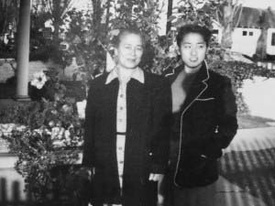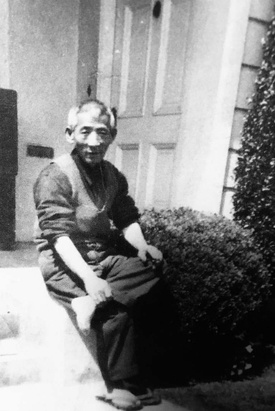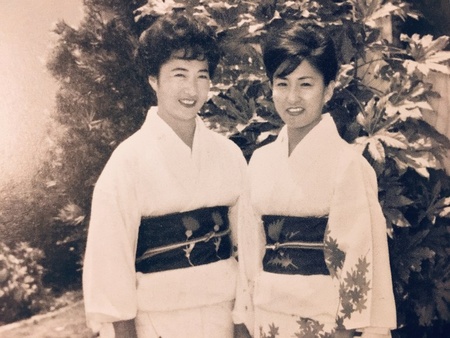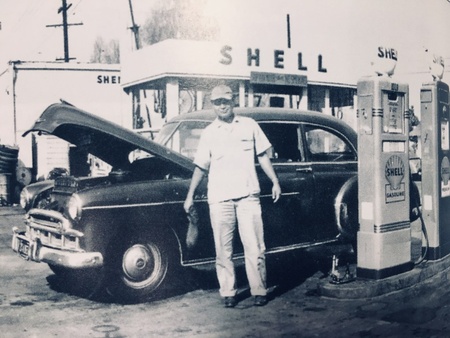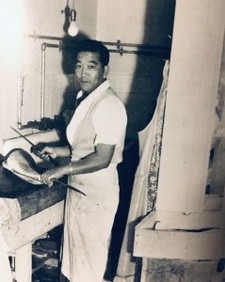It is because now that so much time has passed I think even. The people I speak with are getting more honest about how or they’re taking guesses with how their parents might have felt. I think as people get older they realize you know, ‘I want to say this truth about my past.’
Jack: Yeah. [To Grace] What do you think?
Grace: Being the baby of the family I had way too much fun.
Jack: You have opinions.
Grace: Well my father was probably the hardest person to understand. He’s very strong minded and my mother was very gentle and she took everything.
Jack: Your Mom was tremendous.
Grace: I know. She’s a smart lady, man.
Jack: Your old man was a grouch.
Grace: [laughs] I’d always hear him say, “Bakayaro!” Means ‘He’s stupid.’ Always kept saying that I thought, ‘Oh no there he goes again.’ He’s a mean old dad.
Was he Issei, Kibei?
Grace: Issei.
And your mother too?
Grace: Yeah. But I was the youngest so I got to be spoiled rotten. I had it made. It was hot in there [Poston] but I had a ball in there. I mean I got dark, well, I got darker and my sister is very fair, she’s a beauty queen. She’s very musical. What happened to me? [laughs] But she stood out. Not that she bragged, she was just naturally beautiful, so I was a nothing. But I had fun being the baby of the family. I had it good. I’ve really been lucky.
So it was just fun for you because being a kid–
Grace: Yeah, I was only about five or six in camp. I learned to play in the camp. I didn’t know any better. And how old was your oldest sibling at the time?
Jack: Well Yuki was born in 1926. George was born around 1930, something like that. But then you have two families sort of like a second marriage. You’re the product of the second marriage. Your mom and your dad had families of their own before. So all together you’re about 13, 14 kids.
Grace: Oh, golly I’m the baby of the family. Didn’t know any better.
Jack: But then you know, there’s a theory of mine that they all had big families because they needed big families. And forget about education. Today all you do is push a button, just like a slot machine.
Grace: But you got to go to university earlier than other Japanese.
And where did you go to school?
Jack: UCLA. I got all my degrees there pretty much.
And what did you study?
Jack: I was going to go into engineering. I got accepted to Berkeley engineering. school. Then I opted to go into the army instead. So I volunteered for the military and then I got caught in the Korean War. And then by the time I got out I figured engineering is not for me, I really need to get into management. Corporate management. My first job offer was ABCC. Atomic Bomb Casualty Commission in Hiroshima. Right after the bomb hit, seven years later I graduated from UCLA in a Management Program and one of the first job offers was ABCC personnel director. And I went to her dad and said, ‘I want to take your daughter to Hiroshima with me.’ And he says no. Her sister had to get married first.
Very traditional.
Jack: Yeah that’s the Issei way of doing things. So I couldn’t take her so I didn’t take the job. But it would have been a completely different life if I went, took her. We’d be Japanese all the way through.
And so how did you two meet?
Jack: [To Grace] How did we meet?
Grace: You came to the market where I worked. Sawtelle Fish Market [laughs].
Jack: You were a little brat there. She was on Sawtelle. Her father was a manju maker and a tofu maker.
Grace: My brother filleted the fish. He was really good, talented. Beautiful work.
Jack: Then her sister did the cash register.
Grace: Oh boy, what’d I do?
Jack: And you took over. You couldn’t even count change.
So your family owned this market, then.
Grace: Yeah right on Sawtelle, right in the middle.
Jack: But your mom liked me, that’s why. But we really met at Bob Fujimoto’s gas station right there. I was working there for Bob. He’s not a relative or anything.
And your families didn’t know each other at all before?
Jack: No. [To Grace] I met you at the gas station. You drove in and you said, ‘One gallon, one dollar,’ or whatever.
So you were pumping gas?
Jack: Yeah, it was pumping gas.
Grace: Funny how we met, huh?
It’s a great story because you know that that does not happen anymore. It’s only relevant in this time period.
Jack: I worked five jobs. I couldn’t take her to the Coconut Grove. Coconut Grove was the big place where all the actors and actresses were, and the Hollywood Derby or whatever it is.
The Brown Derby?
Jack: Brown Derby, yes, big deal. And she wanted to go and I didn’t have any money. So I worked five job just to take her.
Grace: [laughs] Oh gee, how nice.
[To Grace] Where were your parents from, what prefectures?
Grace: Aichi-ken. Nagoya.
So they knew each other from Japan or no?
Jack: Father was here in San Francisco and he ran a hotel. And then her mother went back to Japan with all the kids and she came to San Francisco and that’s where they met, she stayed at that hotel. But they moved to Salinas because she won a raffle. She won about $3,000 and that was enough money to move a family so that he could start a business. And if he ran a hotel he couldn’t make tofu, couldn’t make manju.
Grace: He made the best tofu. We grew up on tofu.
Jack: He was very talented that way. But that was sad that Akira could never get out of his shell because the old man would always tell him, ‘Do this, do that.’
Grace: My brother was handsome, very talented but he was bossed around, it was kind of sad.
What do you think he would have wanted to do?
Jack: He wanted to go to school. But that’s not typical of Nisei because many of Nisei did their own thing. Like Bob Fujimoto. But your dad was hot-tempered. That’s why Akira couldn’t get out of his yoke.
If you’re thinking about the legacy of camp and seeing the younger people trying to remember it, what do you hope that younger people are going to do with this history?
Jack: The concentrated JA is now in Venice. Very strong JA. Because you know the ghetto, Sawtelle ghetto, eventually all the kids – after the Nisei, the Sansei, Yonsei – they all got a good education. Once they got a good education, they weren’t going to stay in the ghetto. Venice got a very strong Japanese American identity. And then like our kids, they gravitated to Torrance. And they feel very comfortable in that environment.
How many children do you have?
Grace: Four.
Have you spoken to them about your history and what happened?
Jack: Yeah, I’ve shared it. It’s nothing new for them, we’ve talked about it for many years. Our son is very active in the community. Very active in the JCI in Gardena, Japanese Cultural Institute. So now I’m asking him to see if he can figure out a way of getting a logo for Sawtelle Japantown. We need a logo. So he’s working on that.
So if you talk about diversity on one hand and the strength of the community itself, the community is more and more dispersed. So Sawtelle itself is no longer a Japanese community. People come from all over to participate in Sawtelle activities, to hang out there. It’s really the food, retail shops, the services are still there.
[To Grace] I’m not going to take you to a $150 omakase.
Grace: $150! Really? Omakase? Give me the money, I’ll buy my own.
Jack: What do you want to prepare?
Grace: Sashimi.
Jack: What kind of sashimi?
Grace: Maguro. That’s my favorite. I want the mannaka [middle]. Not the tail or the head, mannaka. I can always picture it.
Thank you to Eric Nakamura for coordinating this interview.
* This article was originally published on Tessaku on November 27, 2018.
© 2018 Emiko Tsuchida


